Hip pain takes a toll on your life. It is one of the most common complaints among individuals of all ages. It affects everyone from athletes to the elderly, and can occur for a variety of reasons.
But what is the fastest way to relieve hip pain?
Fortunately, there are a variety of options for reducing and managing hip pain. From lifestyle changes to medical treatments, some solutions can help you get rid of your hip pain fast.
Let’s learn about the effective treatment options that can give relief from hip pain super fast.
What is Hip Pain?
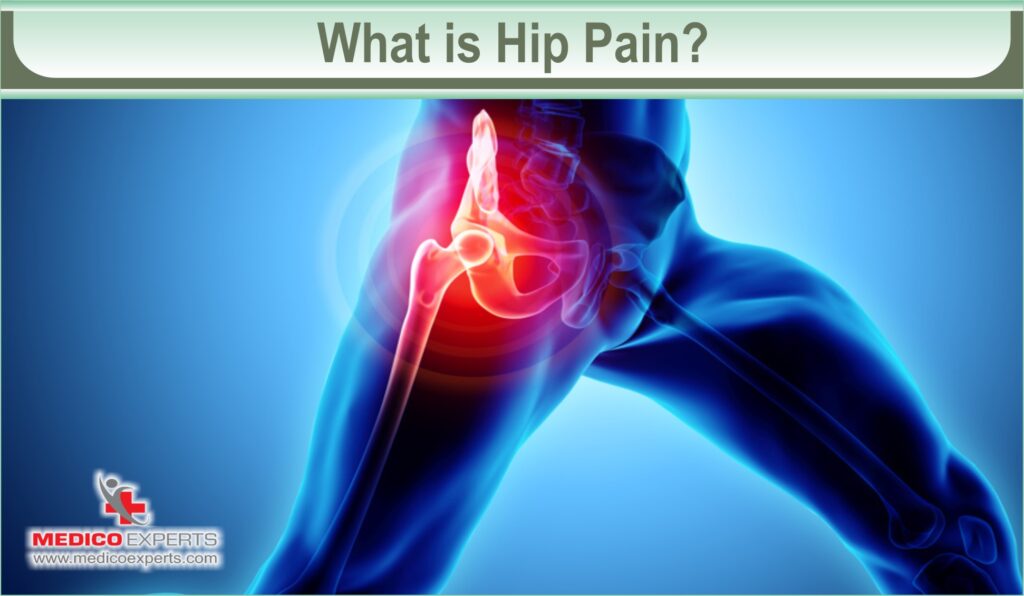
The largest ball-and-socket joint in the body, the hip joint, is able to handle repeated motion and a considerable amount of degradation. Its unique structure enables smooth movement.
Common causes of hip pain include arthritis, injuries, and poor posture. Regardless of the cause, it can be incredibly uncomfortable and make it difficult to do everyday tasks. Fortunately, there are a variety of remedies and treatments available to help relieve hip pain quickly.
Hip pain can be incredibly debilitating, making it difficult to move around and perform everyday activities. If your hip pain is caused by an underlying medical condition, it is important to consult with a doctor.
Before seeking treatment for your hip pain, it’s important to determine the type of pain you are experiencing.
Now that you have a better understanding of the different types of hip pain, let us see what causes them.
What Are The Causes of Hip Pain?
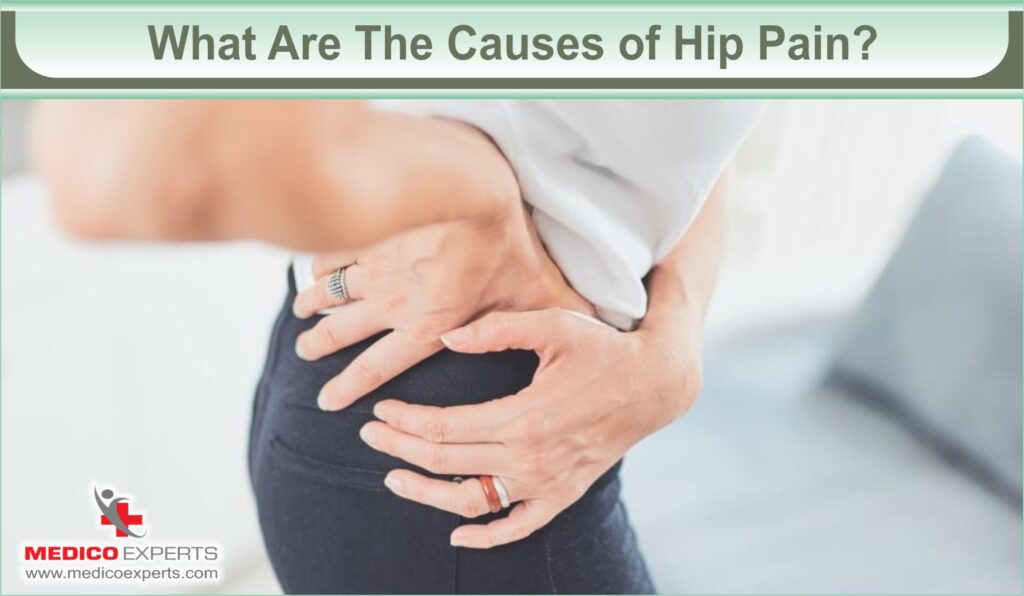
Hip pain can be caused by a variety of characteristics, including:
- Overuse/ overtraining
- Injuries and fractures
- Arthritis (including osteoarthritis and rheumatoid arthritis) is a form of joint inflammation.
- Bursitis
- Muscle or tendon strain
- Tension in the hips
- Poor posture
- Standing or sitting for long periods.
Let’s learn about the prominent ones in detail.
Arthritis-related hip pain:
This type of pain is often caused by osteoarthritis and other types of arthritis. It tends to be a dull ache that worsens over time. Arthritis is a common cause of hip pain, and it can be caused by inflammation of the joints or cartilage in the hip area.
Injury-related hip pain (Soft Tissue/ Muscle Injuries):
This type of pain usually occurs due to an accident, fall, or sports-related injury. It can range from mild to severe and is often accompanied by swelling and bruising.
Postural hip pain:
This type of pain is caused by poor posture, which can result in tight muscles and an inability to move the hip properly.
Neurological hip pain:
This type of pain is caused by nerve-related issues and is often accompanied by numbness, tingling, or weakness.
Labral Tears:
This type of pain is often caused by a tear in the labrum, which is the cartilage that surrounds the hip joint. It can cause sharp, burning pain in the hip and surrounding area.
Ankylosing Spondylitis:
This type of pain is caused by ankylosing spondylitis, a type of arthritis that affects the spine. It can cause lower back and hip pain, as well as stiffness.
Hip Impingement:
This type of pain is caused by a condition called hip impingement, which occurs when the ball of the femur rubs against the hip socket. It can cause sharp pain when the hip is flexed or moved in certain ways.
Let’s explore some treatment options for hip pain, now that you have an understanding of its causes.
What are the symptoms of a hip pain?
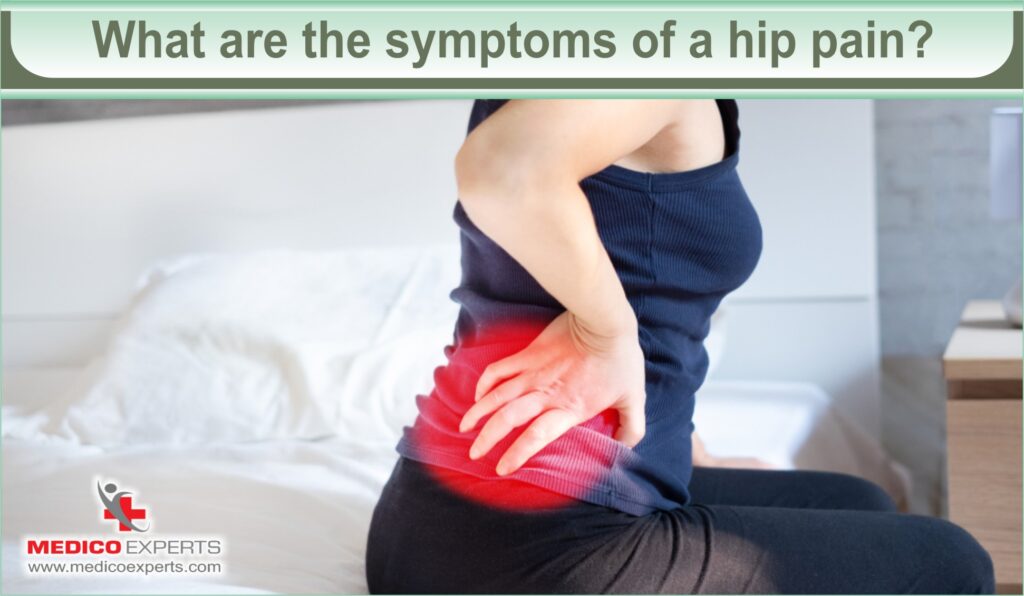
Hip disorder symptoms vary based on causes and affected areas.
Common symptoms include:
- Hip limping,
- Reduced mobility,
- Referred pain,
- Muscle stiffness, and
- Leg pain with weight-bearing
Learn more on symptoms here…
What Are The Conventional Treatments For Hip Pain?
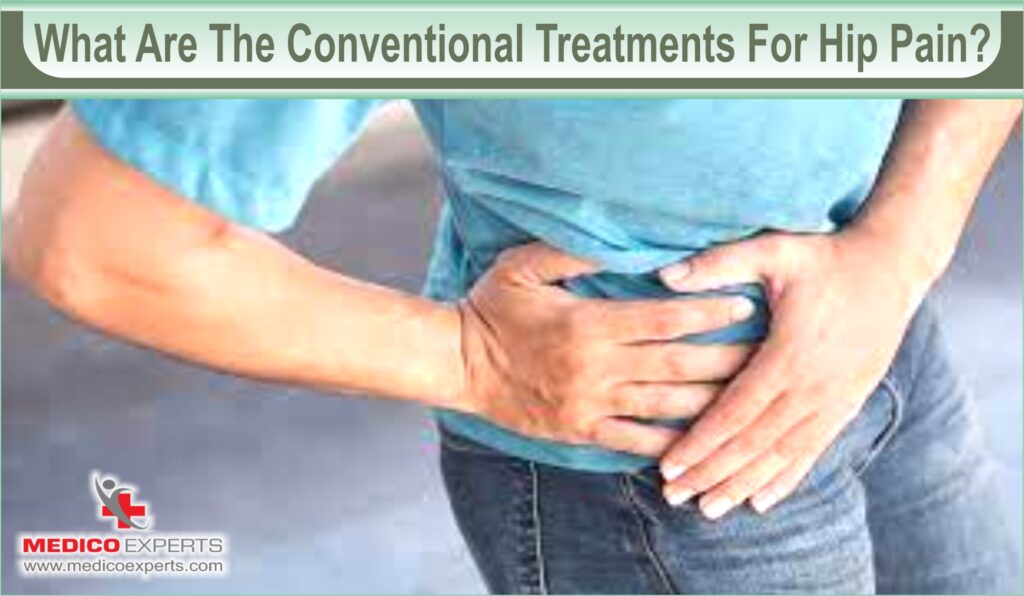
If you are experiencing hip pain, there are a variety of treatments available that can provide relief.
These include:
Physical therapy:
A physical therapist will work with you to develop a series of exercises and stretches that can help reduce hip pain. They may also recommend lifestyle modifications, such as avoiding activities that aggravate the pain.
Few drawbacks of Physical therapy:
- Physical therapy may require a longer commitment of time than other treatments, which can be inconvenient for some individuals.
- It can be costly if the sessions are not covered by insurance.
- It can be uncomfortable, as it may involve stretching and strengthening exercises that cause pain or discomfort.
Occupational therapy:
Occupational therapists can help you gain the strength and mobility needed for daily activities. They may also provide assistive devices, such as braces or canes, to help with balance.
Few drawbacks of Occupational therapy:
- Occupational therapy can be time-consuming and may require multiple sessions.
- The cost of occupational therapy can also be prohibitive for some individuals.
- It may not be suitable for all types of hip disorders, depending on the severity and nature of the problem.
Medications:
Pain medications, such as non-steroidal anti-inflammatory drugs (NSAIDs), may be prescribed to help reduce discomfort.
Few drawbacks of Medications:
- Medications may have side effects, such as stomach irritation and heartburn.
- They may not be effective for all types of hip pain, depending on the underlying cause.
- They may not provide long-term relief and can become habit-forming if used for prolonged periods.
Surgery:
Surgery may be recommended if other treatments are not helping to reduce pain and improve mobility. The type of surgery depends on the cause and severity of the hip pain.
Few drawbacks of Surgery:
- Surgery is invasive and carries a risk of complications.
- It can be costly depending on the type of surgery required. It may also require a long recovery time. In some cases, the pain may not be completely relieved after surgery.
- There is also the possibility that the surgery could cause further damage or complications.
Therefore, it’s important to discuss all the risks and benefits with your doctor before deciding to proceed with the surgery.
Advanced non-surgical options for treating hip pain in India?
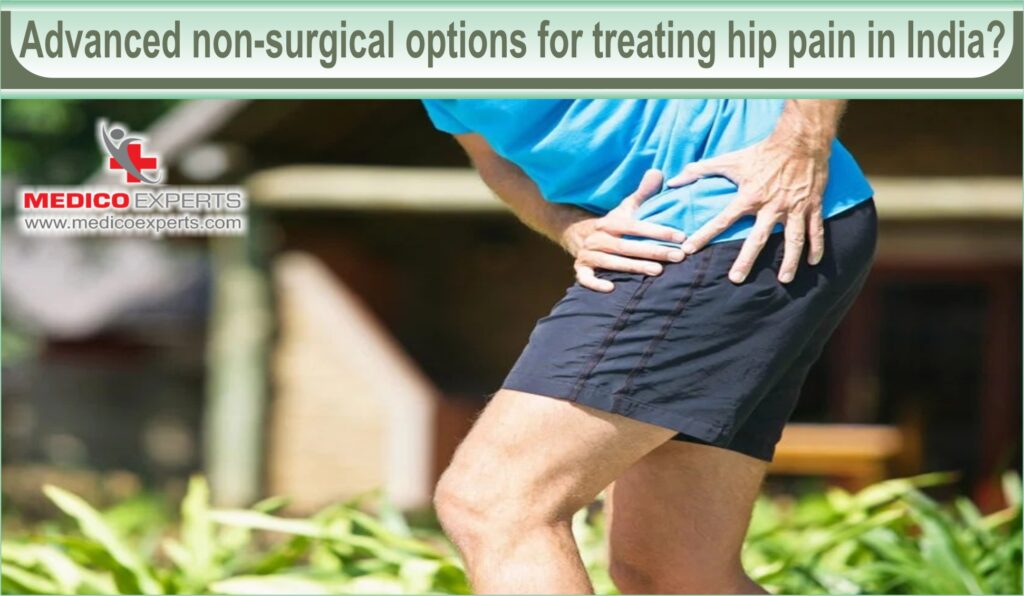
Stemcell therapy for treating hip pain:
Stem cell therapy is an advanced treatment option for hip pain. It involves injecting stem cells into the affected area to promote healing and reduce inflammation. Here at MedicoExperts, our stem cell therapy program is designed to help reduce pain and improve mobility.
Through stem cell therapy, you can harness the unique properties of stem cells to heal damaged hip tissues. These amazing cells can divide and multiply, and they can transform into different types of cells depending on their placement.
When placed near damaged cartilage, stem cells can transform into new, healthy cartilage tissue. The use of stem cell therapy for treating hip joint pain is a modern alternative to traditional methods. It offers several advantages over other therapies.
The procedure of stem cell therapy involves injections only and does not require surgery. It is considered to be a safe and straightforward process. Furthermore, stem cell therapy has been seen to be successful in improving mobility and reducing pain.
At MedicoExperts, we offer advanced non-surgical treatments for hip joint pain that are based on stem cell therapy. Our team of experts will tailor a treatment plan according to your individual needs and help you get back on the road to recovery. Get in touch with us today!
Know here about the outcomes of stem cell therapy for hip pain.
Conclusion
Hip pain can be caused by a variety of factors, such as an injury, arthritis, or impingement. Treatment options vary depending on the underlying cause and severity of the pain. Conventional treatments may include stem cell therapy, physical therapy, medications, and surgery.
At MedicoExperts, you can receive a second opinion from expert doctors. Our team will provide you with a detailed treatment plan that is tailored to your individual needs.
We offer innovative solutions that are tailored to your individual needs and provide relief from chronic hip pain in India. Get in touch with us today! Let us help you find relief from your hip pain quickly and effectively.
FAQ:
Q. How can I determine if my pain is coming from my hip?
A. If you are experiencing pain in the front of your hip or groin area that travels down your thigh to your knee, it is likely related to your hip.
If the pain is in the back of your hip or buttock area and travels down your hamstring to your calf, it is more likely related to your spine.
Q. Are there any exercises I can do to reduce my hip pain?
A. Yes, there are several exercises and stretches that can help to reduce hip pain. Stretches that target the hips, glutes, quads, and hamstrings can help to reduce pain caused by tight muscles or muscle imbalances.
Additionally, strengthening exercises that target the hips and core can help to reduce inflammation and improve mobility.
Q. How long does it take for hip pain to go away?
A. The amount of time it takes for hip pain to go away depends on the underlying cause. Treatment options vary depending on the severity of the pain, and it can take up to several weeks or months for hip pain to completely go away.
If hip pain persists, it is best to seek medical advice from a qualified healthcare professional.
The team at MedicoExperts can help you find the right solution for your hip pain. Get in touch with us today!
Q. Where is hip pain commonly felt?
A. If the pain is on the inside of your hip or in your groin, it may be a problem within the hip joint itself.
However, if the pain is on the outside of your hip, upper thigh, or outer buttock, it is likely caused by issues with the soft tissues surrounding the hip joint, ligaments, tendons, or muscles.
Q: What causes worse hip pain during the night?
A: If you experience hip pain exclusively during the night, it’s likely that your mattress or sleeping position is to blame.
Sleeping on your side can put pressure on your hip joint and cause discomfort.
Moreover, if the opposite hip is forced to tilt forward, it might also become painful.
References
https://www.ncbi.nlm.nih.gov/books/NBK470555/
https://www.ncbi.nlm.nih.gov/pmc/articles/PMC7677471/
https://www.ncbi.nlm.nih.gov/pmc/articles/PMC8622613/
https://www.niams.nih.gov/health-topics/hip-replacement-surgery
https://www.ncbi.nlm.nih.gov/pmc/articles/PMC5467400/
https://www.ncbi.nlm.nih.gov/pmc/articles/PMC6503401/



